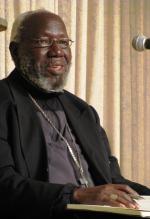 A short, white-haired man stood before some 50 people on a cold winter’s evening at Armagh, the IofC centre in Melbourne. His very demeanour was humble. Bishop Paride Taban, born in South Sudan in 1936, has celebrated 50 years as a priest, 30 as a Bishop.
A short, white-haired man stood before some 50 people on a cold winter’s evening at Armagh, the IofC centre in Melbourne. His very demeanour was humble. Bishop Paride Taban, born in South Sudan in 1936, has celebrated 50 years as a priest, 30 as a Bishop.
“I am coming as your shepherd, not from a political party,” said the Bishop, sometimes known as “the Tutu of South Sudan” for his work in grassroots reconciliation. The Bishop established a “Peace Village” where he uses football, theatre, education and community policing to end violent cattle raiding. Just last May, he concluded a year of patient negotiations to end an ethnic conflict in the state of Jonglei which has cost thousands of lives.
“God created tribes but not tribalism,” he said. “Tribalism is of the devil.”
His narrative was peppered with wise sayings: “Make your neighbours equal to you otherwise they will become jealous,” and “If we don’t begin to love ourselves, it will be very difficult to build a future.”
At least half the audience were young South Sudanese, keen to know if the future was going to be any different from the past. The Bishop counselled them: “Be patient with your elders who are not young enough to know everything – but they do have some wisdom!” To him, service is the key: “If you go for service, you go for people. If you go for power, you go for money.”
Many don’t know the real history of South Sudan. Those who do, know that “we are all cousins, all family”.
His program in Victoria was cohosted by IofC’s South Sudan Australia Peace Initiative, led by Nyok Gor.
Cheryl Wood

